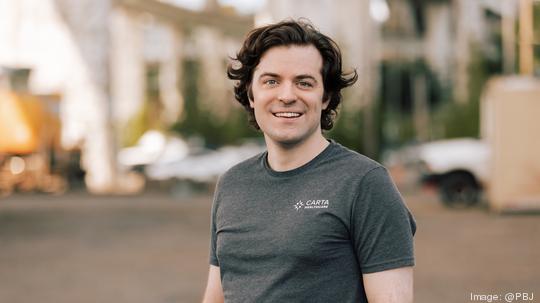
Matt Hollingsworth, a recent Portland transplant, spent a lot of time in hospitals when he was growing up. That’s because his mother battled five bouts of cancer, starting when she was pregnant with him.
“I was in the hospital once a year throughout her life,” Hollingsworth said. “I have more than the normal reason to appreciate my mom and, by extension, the health system for keeping her alive.”
But not everything he witnessed made sense.
His mom would carry around a notebook with her medical history — “the stuff people needed to know to give her care,” such as drug interactions. He saw how caregivers would waste valuable time typing information into electronic health records.
All this led him in 2017 to found Carta Healthcare, which uses artificial intelligence to ease those sorts of data challenges. Five years on, Carta has raised $17.5 million in venture capital and is about to raise another round. While Hollingsworth is based in Portland, where he moved from the Bay Area in 2020, Carta’s 158 employees are scattered over 30 states.
Among other things, the Carta platform can predict how many and what kinds of supplies will be needed for a particular surgery and analyze data to reduce readmissions, all from mining the hospital’s own records. Carta counts 15 health systems as clients, including NYC Health + Hospitals and Common Spirit.
“It’s data the hospital already has but we’re able to use it to derive action, so people have a better quality of care,” Hollingsworth said.
Stanford's starring role
Hollingsworth, who holds a B.S. and Master’s in physics from the University of Tennessee and MBA from Stanford Business School, started his working life as a high-energy physicist. He spent six years working in a Swiss lab with the research team that won the Nobel Prize for discovering the Higgs Boson “God particle.”
Hollingsworth also co-founded a startup called Global Dressage Analytics and proposed, won and managed projects for the Department of Defense.
But it was that notebook his mom carted to doctors’ offices that really got him thinking. Electronic health records, he came to believe, are designed more for billing than for documenting medical histories.
“I started digging in and found the whole system is a mess,” he said. “If I wanted to make a difference, I decided I should study it and get behind the scenes and figure out why it’s as messed up as it is.”
Carta stands at the intersection of health care and tech transfer, Hollingsworth said.
“I wanted to bring cool ideas into the real world to make a positive impact,” he said.
He joined the health care operations group at Stanford. Although Carta isn’t a direct spinout of the Stanford lab, it’s an “ideological spinout,” Hollingsworth said.
“What the lab does is (develop) the general idea, and the whole purpose is to use data to improve care,” Hollingsworth said. “We did several projects and got published.”
He and his fellow researchers built a predictive model for what surgical supplies would be used for a procedure, after learning that operating rooms often waste items or don’t have enough.
His platform can collect data in days, rather than years, he said. He uses AI to read notes and data “in a way only humans could do.”
“It unblocks a whole realm of useful things,” he said.
Product lines
Carta has two product lines. The Atlas platform uses AI to free staff from the manual labor of extracting data from medical records and into clinical registries.
Dr. Andrew Shin, a Stanford professor of pediatrics and cardiology who collaborated with Hollingsworth and is currently an advisor to Carta, said extracting data from the electronic health record is “the Achilles heel of our time in terms of doing quality improvement, patient safety work, operations, managing workflow and doing research.”
Most hospitals participate in registries that aggregate data to learn about patient populations, but the extraction work is done manually, making it expensive and inefficient.
“That’s where Matt and the ideas we have been using for more sophisticated technologies come in to help that extraction piece," Shin said.
Carta’s Navigator uses data the company curates help figure out staffing needs, devise the optimal operating room schedule, match anesthesia services to caseload and measure and manage adherence to surgical site infection preventive measures.
The platform can integrate with the hospital’s EHR system, as well as other IT systems for various departments, such as cardiology and inventory management.
“The platform we built doesn’t care where the data comes from,” Hollingsworth said.
CARTA HEALTHCARE
What: Uses artificial intelligence-driven technology to allow health systems to collect, analyze and act on their own data
Founded: 2017
Co-founder and CEO: Matt Hollingsworth
Raised: $17.5 million



